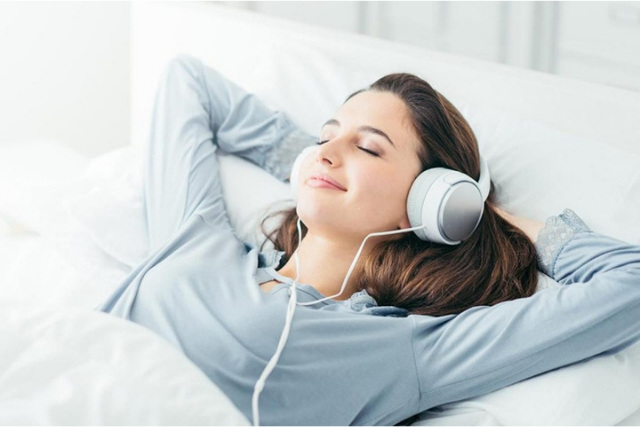Sleeping while listening to music has become a common hobby for everybody in this time and age. And what better way to listen to music conveniently than earbuds? Wireless, Bluetooth, or normal earphones are all hassle proof devices that block out the noise and soothe us by playing our favorite songs. After a long and stressful day at university, work or home, the easiest way to ward off thoughts and get a peaceful night’s sleep is to curl up in bed with your comfort music playing in your ears. However, there is one basic question.
In This Article:
All You Need to Know About Sleeping with Earbuds in
Is it Safe?
To put it briefly, anything is safe in moderation, hence if you use earbuds appropriately, it is absolutely fine to sleep in with them. However, there are a few basic things to keep in mind. Do not listen to music on a very high volume as it can harm your ear canal and auditory functionality. Try not to do it every single night as well. Also, if you are wearing normal earbuds make sure they do not apply too much pressure into your ear while you are falling asleep. It’s best to have more knowledge, so here are some more dangers and benefits of sleeping in with earbuds.
Dangers of Sleeping in with Ear Buds
If used inappropriately, here are some dangers.
Accumulation of Ear Wax
Earbuds that settle deeper than usual in your ear, you may develop a build-up of ear wax. Don’t worry, everyone forms some ear wax anyway, but earphones can increase that by blocking the air circulation near your ear, which will make the wax develop closer to your eardrum. If lots of wax ends up accumulating over a period of time, it might affect your hearing and be difficult to do away with.
Otitis Externa
This condition gives rise to discomfort in your ear canal. In the most serious cases, the skin surrounding your ear canal can slowly peel off causing unwanted entry of fluid into the ear. This can lead to pain in the outer ear, irritation, and difficulty of hearing. This can happen to anyone who uses earphones too much on a regular basis, so better be cautious.
Hearing Problems
Apart from ear wax accumulation and Ottis Externa, hearing problems can also be caused due to excessively loud music. A normal conversation ranges between 60 dB to 80 dB – and that is the volume you need to maintain if you plug in your earphones while sleeping, otherwise, it will affect your inner ear and eardrum and lead to irritation and partial loss of hearing.
Compromise on Your Safety
Say a fire alarm goes off or someone knocks on the door in an emergency. These might be rare cases but these are very much possible. In that case, sleeping with earbuds in which they cancel outside noise is not a good idea.
Necrosis
This only happens in very severe cases, but necrosis can lead to the death of tissue surrounding your ear and cause permanent loss of hearing.
Benefits of Sleeping with Ear Buds on
We have covered most of the disadvantages, now here’s to the good that might happen.
Blocking Out Unwanted Noise
In metropolitan cities and crowded spaces, people’s voices, sounds of traffic and chaos can take away a peaceful night’s sleep. Noise-canceling earphones can help one to shut out the noise of horns, cars, shouts, and dogs barking and they can relax listening to their favorite music.
White Noise for Relaxation
Many calming tunes played in the violin, cello, piano, or curated sounds of rain falling or the ambiance of a quiet forest are now easily available. These sounds help people to relax after a long, hectic and tiring day. Studies in the Journal of Advanced Nursing have shown that white noise can reduce anxiety, lower the erratic heart rate and calm the nerves. In the study, the people who slept while listening to music had a better good night’s rest and felt more well-rested in the morning than the ones who slept without music. The sedative music caused 35% better sleep in the study.
Helps Patients with PTSD and Insomnia to Sleep Better
PTSD or Post Traumatic Stress Disorder is one where flashbacks of a traumatic event haunt the patient, causing psychological problems- which include anxiety attacks and flashbacks. Patients with PTSD find it very hard to get a relaxing sleep for the night. Patients with insomnia have an irregular sleep pattern. They do not have long hours of undisturbed sleep, they have difficulty falling asleep, they often wake up in the middle of the night or early in the morning. Insomnia is not completely curable. In both cases of PTSD and insomnia, it is best to consult a psychiatrist. A temporary and partial solution in these cases can be listening to relaxing music while falling asleep as they soothe your nerves and calm the buzzing thoughts in your mind.
Stimulates Production of Serotonin
Good relaxing music causes feelings of ASMR (autonomous sensory meridian response) which is a relaxing, often sedative sensation that begins on the scalp and moves down the body and produces serotonin.
Precautions
- If you must use an earphone, use it at a low volume and do not press it deep into your ears.
- If you are sleeping alone, try using a radio or sound system instead.
- If you do not have either, use a mobile phone or laptop.
Remember that it is safe to use headphones as long as you are aware of the dangers and precautions of sleeping in with earbuds.
Sources:
http://news.bbc.co.uk/2/hi/health/4228707.stm













